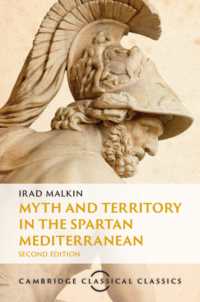Full Description
This book is a new English translation of the two shortest, most controversial and perhaps most vibrant books in the Hebrew Old Testament - Song of Songs (Song of Solomon) and Qohelet (Ecclesiastes). The two books slipped into the Jewish - and eventually Christian - Canon by a series of misrepresentations. The first, Song of Songs, is linguistically the latest book along the Biblical Hebrew dialect continuum, perhaps as late as 300-100 BC to judge by its language, which closely resembles Mishnaic Hebrew (2nd Cent. AD). The book is a lush, carnal poetic account of an illicit love affair, where lusty exchanges between the female beloved and her male lover are interspersed with rustic love songs. The ultimate provenance of the text may be older than the time it was recruited into the Canon, or the time suggested by its late dialect.The second book, Qohelet, is linguistically earlier on the Biblical Hebrew dialect continuum, though still following the return from the Babylonian exile (ca. 550 BC). Unlike Song of Songs, which is linguistically coherent and bears all the marks of having been produced by a native speaker (or speakers), Qohelet is replete with non-native lexical and grammatical usage, and was most likely produced by a speaker (or speakers) of Aramaic, the lingua franca of the Persian empire and the returning exiles. Multiple English translations of the two books exist. Nonetheless, in one way or another all previous translations suffer from two main drawbacks: First, their interpretation of the grammar - and on occasion also the vocabulary - of Biblical Hebrew is sometimes questionable. And second, the poetic quality of their English leaves much to be desired, paling in comparison with the stark beauty of the Hebrew original.This book attempts to do justice to both the contents and form of these two magnificent, deliciously subversive poetic works. The Hebrew texts and their English translation are preceded by two scholarly chapters, the first about the Biblical Hebrew dialect continuum , the second about the science and art of translation.





